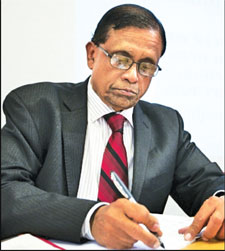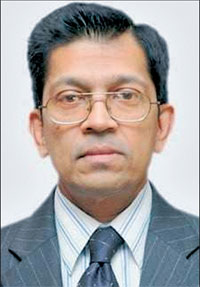|
Role of International Law in contemporary diplomacy –
Part II:
The challenge posed by NGOs
Text of the Romesh Jayasinghe Memorial Oration
delivered by Dr Amrith Rohan Perera PC at Sri Lanka Foundation
Institute, Colombo on May 30, 2012
The adoption of controversial resolutions within the Security
Council, authorizing sanctions and paving the way for military action
including for regime change, in different global situations, have
brought to the forefront, difficult issues in the relationship between
states and international organizations. These concerns have led to the
International Law Commission (ILC), the principal norm creating body of
the United Nations, to formulate Draft Articles on the Responsibility of
International Organizations, to follow up on its work on state
responsibility.
|

Dr Amrith Rohan Perera PC |
The role and responsibility of non-governmental organizations (NGOs)
and the need for codes of conduct for these organizations is assuming
equal importance with the increased role being performed by such
entities, particularly in fields such as environmental protection,
protection of human rights and the providing of disaster relief. The
challenge is to ensure that humanitarian objectives are not diverted by
extraneous considerations or agendas, while recognizing the useful role
these entities could perform in difficult situations, such as in
providing disaster relief, and accordingly, preserving their operational
flexibility, to facilitate bona fide humanitarian activities.
Thus, in order to keep pace with these evolving conditions of
international life, international law is called upon to deal with
complex and varied relationships that have emerged at different layers
in the contemporary global order; at the inner-state level; at the level
of the state and the individual; and at the level of state and
international organizations, as well as between such organizations.
Academic discipline
In this contemporary multi-layered framework, the primary task of the
international lawyer and the diplomat is one of seeking and achieving a
careful balance of contending interests and principles in an attempt to
preserve and safeguard the essential interest of the state, on the one
hand, while ensuring that the rights of the individual are not
sacrificed.
International Law and diplomacy in the contemporary global order
In the contemporary global order, International Law is not merely an
academic discipline. It has far reaching political implications for the
international community of states in the real world of international
politics. It would not be incorrect to surmise that International Law
making is essentially a 'political activity'. While an international
lawyer plays a vital role in that process, the role of the diplomat,
also assumes a crucial position, given the underlying political
considerations which are interwoven into that process.
For the success of a global initiative, whether to create a new
regime to replace the old order, or in the evolving of new rules of
international trade, the efforts of the international lawyer need to be
backed up by effective diplomatic and political initiative, leadership
and skills, in order to reach the desired goals. The multi-lateral law
making process in particular, requires skilful negotiations directed
towards reaching mutual accommodation, whilst safeguarding fundamental
national positions. It would be an unrealistic expectation that the
final outcome of a process should reflect the maximalist position that a
state would have assumed at the beginning of the process, yet the
outcome could be one which addresses the basic concerns and interests of
a given state, while accommodating the interests of others. Such an
outcome would not be beyond realisation, if there is recourse to skilful
diplomacy with a mix of political realism.
With regard to the challenges inherent in the multi-lateral
law-making process, it has been pertinently observed that.
|

Romesh Jayasinghe |
“Deliberation is an essential lubricant of any law-making process,
because it facilitates discussion, negotiation, compromise, persuasion,
influence, and participation. It is what allows participants a voice,
whether or not they have a vote”.
Lessons from the past
This statement encapsulates the challenge confronting contemporary
multi-lateral diplomacy. It underlines the need to recognise that the
milieu of multilateral negotiations require an acknowledgement of the
existence of a multitude of concerns and interests and the success of
diplomacy will depend on finding that middle ground, that fine balance,
which would ensure that one's fundamental interests are secured, whilst
those of other participants in the multilateral process are also taken
into account and accommodated and are not shut out. What is required is
a calibrated and nuanced approach, without sacrificing one set of
interests for another.
In dealing with challenges of the present and of the future, it would
not be out of place to take a brief look back and draw some lessons from
the past. The 1960s and the 1970s which ushered in an expanded
international community of states consequent to the decolonisation
process, is sometimes described as the 'golden age of multi-lateral
diplomacy', where the developing world gave effective political and
diplomatic leadership in setting out a new 'law making agenda' and made
a decisive contribution to vital political and economic issues of the
day.
The agenda was wide and varied and included issues such as Permanent
Sovereignty over Natural Resources, adoption of a New International
Economic Order (NIEO) and a New Legal Order for the Ocean to harness
ocean resources for the common benefit of all mankind.
It has been observed that the negotiating process at the Third United
Nations Conference on the Law of the Sea best illustrates fact that
power and influence are not synonymous in the real world of
multi-lateral diplomacy and underlines the fact that the United Nations
system has empowered the so-called 'weaker states' in a way that would
not have been possible previously. To give an important example, the Law
of the Sea negotiating process which recognised the 'consensus
principle' as the cornerstone of negotiations, in that no issue would be
put to a vote, unless and until all efforts at reaching a consensus had
been exhausted (the then innovative 'gentlemen's agreement'), enabled
the developing world to maximize economic advantages whilst recognising
the strategic and military interests of the major users of the oceans,
the 'Major Maritime Powers'. Thus a new concept of an Exclusive Economic
Zone (EEZ) giving coastal states resource jurisdiction over an area of
200 nautical miles from the coast emerged, the quid pro quo being the
recognition of the freedom of navigation of all states in these waters.
This was a compromise par excellence, accepting sovereign rights over
resources, in return for the unhindered rights of navigation which
addressed the security concerns of the major maritime powers. It was
essentially a compromise that was realistic and politically feasible.
Thus, through a combination of effective diplomacy intermingled with
political realism, it was possible to secure innovative legal concepts
and principles, having great potential to the interests of developing
countries, a process in which Sri Lanka played a significant role.
Current challenges
Varied concerns have been raised whether, in the aftermath of the
'golden age' of multi-lateral diplomacy of the 1960s and 70s and with
end of the Cold War, the developing world has lost its leverage and
diplomatic clout to make an impact on the contemporary International Law
making process.
The growing role and the initiatives of the Security Council, in what
can best be described as 'crisis-driven law making' as manifested in the
establishment of ad-hoc criminal tribunals, bypassing the established
procedures for law making in the General Assembly' the increasing action
being resorted to under Chapter VII of the United Nations Charter and
the plethora of Resolutions being adopted, imposing wide and varied
sanctions on states, as well as the emergence and the influence of the
World Trade Organisation (WTO) in the field of international trade,
where the developing countries lack the requisite political leverage
over the major trading economies to be able to promote their own agenda,
are all cited as major factors which have led to the diminishing
political clout of the developing world.
To be continued |



